Amateur writer and crafter. Bartender and foodie. Fandoms: Marvel, Check Please, Steven Universe, Hilda, and many more! This blog is mostly my original posts and reblogged writing/art advice.
Don't wanna be here? Send us removal request.
Text
my fave writing reminder

honestly, this phrase has been on my mind more times than i can count. i've kidnapped it, taken it as a hostage with no ransom money because i need it to live permanently in my head.
48K notes
·
View notes
Text
My average writing experience:
"Alright I think I'm almost done actually-"
*Google doc grows second health bar and a choir starts singing in latin*
69K notes
·
View notes
Text
Skip Google for Research
As Google has worked to overtake the internet, its search algorithm has not just gotten worse. It has been designed to prioritize advertisers and popular pages often times excluding pages and content that better matches your search terms
As a writer in need of information for my stories, I find this unacceptable. As a proponent of availability of information so the populace can actually educate itself, it is unforgivable.
Below is a concise list of useful research sites compiled by Edward Clark over on Facebook. I was familiar with some, but not all of these.
⁂
Google is so powerful that it “hides” other search systems from us. We just don’t know the existence of most of them. Meanwhile, there are still a huge number of excellent searchers in the world who specialize in books, science, other smart information. Keep a list of sites you never heard of.
www.refseek.com - Academic Resource Search. More than a billion sources: encyclopedia, monographies, magazines.
www.worldcat.org - a search for the contents of 20 thousand worldwide libraries. Find out where lies the nearest rare book you need.
https://link.springer.com - access to more than 10 million scientific documents: books, articles, research protocols.
www.bioline.org.br is a library of scientific bioscience journals published in developing countries.
http://repec.org - volunteers from 102 countries have collected almost 4 million publications on economics and related science.
www.science.gov is an American state search engine on 2200+ scientific sites. More than 200 million articles are indexed.
www.pdfdrive.com is the largest website for free download of books in PDF format. Claiming over 225 million names.
www.base-search.net is one of the most powerful researches on academic studies texts. More than 100 million scientific documents, 70% of them are free
302K notes
·
View notes
Text
one of my favorite things to do in limited perspective is write sentences about the things someone doesn't do. he doesn't open his eyes. he doesn't reach out. i LOVE sentences like that. if it's describing the narrator, it's a reflection of their desires, something they're holding themselves back from. there's a tension between urge and action. it makes you ask why they wanted or felt compelled to do that, and also why they ultimately didn't. and if it's describing someone else, it tells you about the narrator's expectations. how they perceive that other person or their relationship. what they thought the other person was going to do, or thought the other person should have done, but failed to. negative action sentences are everything.
45K notes
·
View notes
Text

the 2 types of hnkn i like to draw!
1K notes
·
View notes
Text
i dropped by my favourite secondhand bookstore and found what is possibly the most incredible knitting book iver ever seen. that teaches you how to knit little gardens and sew them into a massive quilt 3d. the photos i took are atrocious and do NOT do this book justice

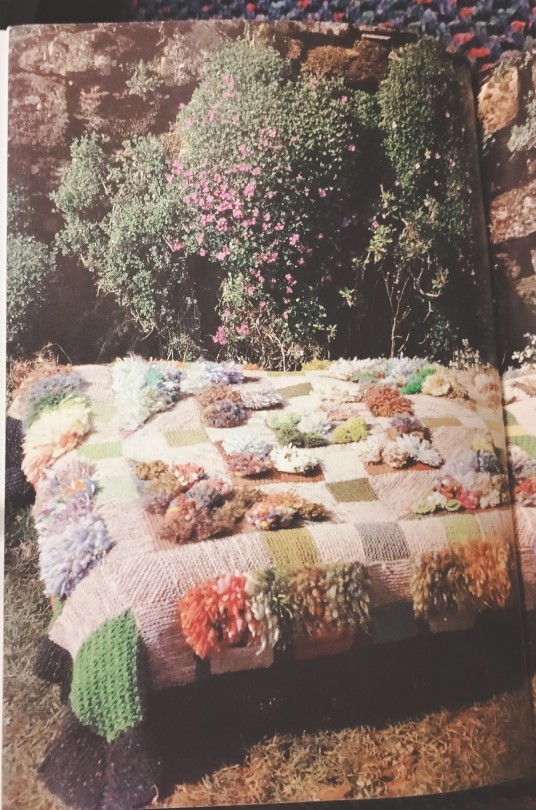
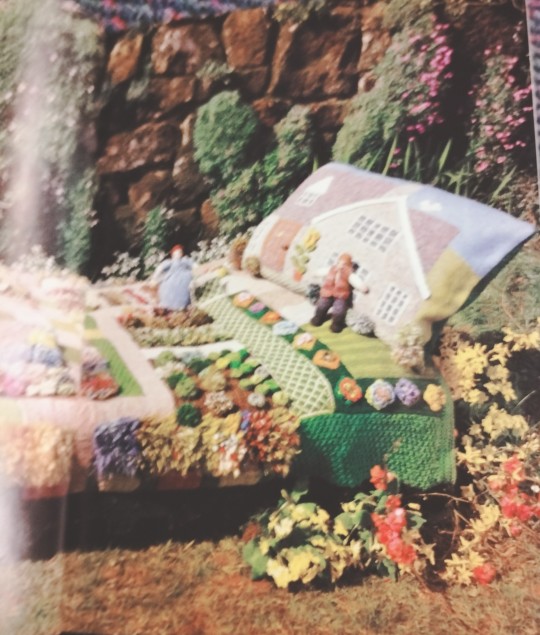

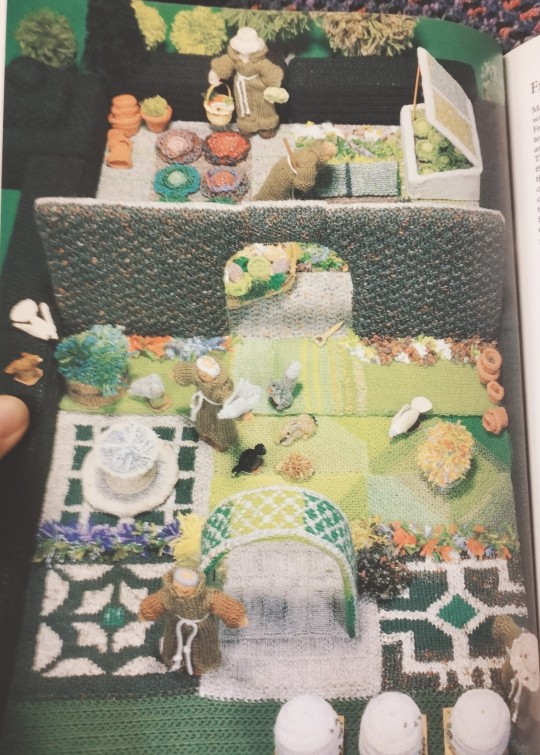
thats a PRIORY GARDEN WITH MONKS
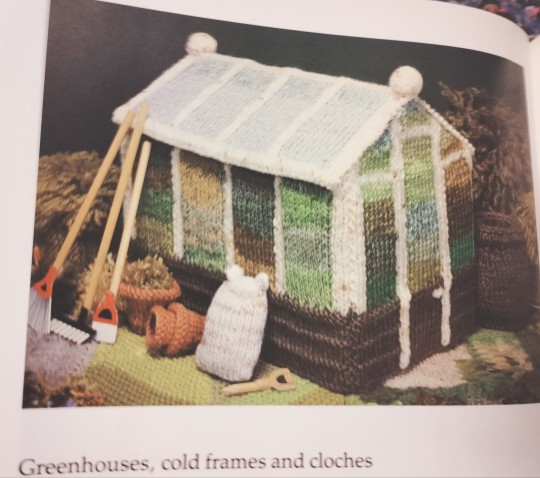
IT EVEN TEACHES YOU HOW TO MAKE ALL THE TOOLS ABD BASKETS AND POTS AND PLANTS
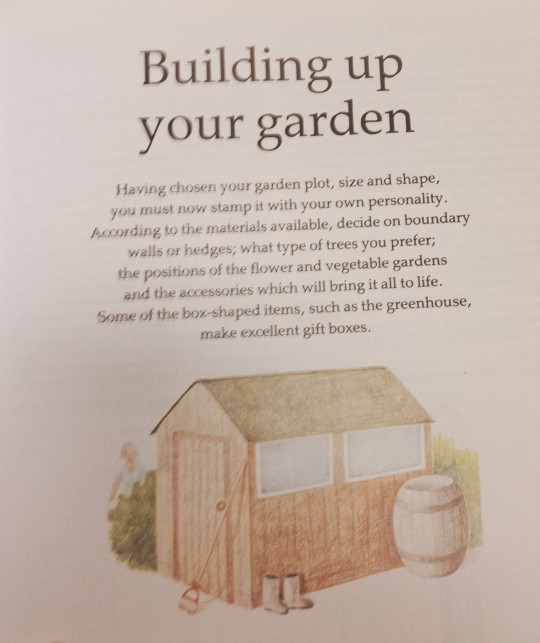
LOOK AT THE SOME OF THE FOLIAGE
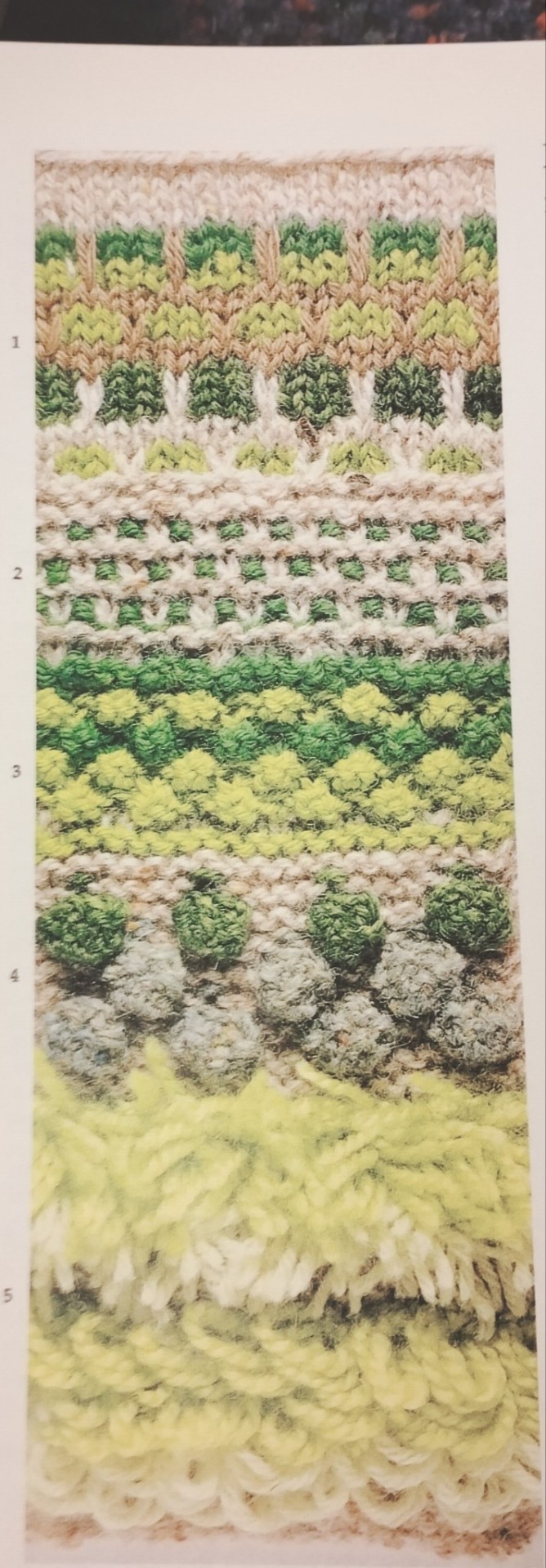
i have never been more upset to not have $30 ready to buy this. its incredible. i have to find it online somewhere. i knew the moment i saw this i had to share it with EVERYONE
28K notes
·
View notes
Text
A lot of younger people have no idea what aging actually looks and feels like, and the reasons behind it. That ignorance is so dangerous. If you don’t want to “be old,” you aren’t talking about a number of years. I have patients in their late 80s who could still handily beat me in a race—one couple still runs marathons together, in their late 80s—and I lost someone who was in her early 60s to COPD last year. What you want is not youth, it is health.
If you want to still be able to enjoy doing things in your 60s and 70s and 80s and even 90s, what you want to do, right now, is quit smoking, get some activity on a regular basis (a couple of walks a week is WAY better for you than nothing; increasing from 1 hour a day of cardio to 1.5 will buy you very little), and eat some plants. That’s it. No magic to it. No secret weird tricks. Don’t poison yourself, move around so your body doesn’t forget how, and eat plants.
If you have trouble moving around now because of mobility limitations, bad news: you still need to move around, not because it’s immoral not to, but because that’s still the best advice we have. I highly recommend looking up the Sit and Be Fit series; it is freely available and has exercises that can be done in a chair, which are suitable for people with limited mobility or poor balance. POTS sufferers, I’m looking at you.
If you have trouble eating plants because of dietary issues (they cause gas, etc.) or just because they’re bitter (super taster with texture issues here!), bad news. You still want to find a way to get some plants into your body on a regular basis. I know. It sucks. The only way I can do it is restaurants—they can make salads taste like food. I can also tolerate some bagged salads. On bad weeks, the OCD with contamination focus gets so bad I just can’t. However, canned beans always seem “safe,” and they taste a bit like candy, so they’re a good fallback.
If you smoke and you have tried quitting a million times and you’re just not ready to, bad news. You still need to quit. Your body needs you to try and keep trying. Your brain needs it, too. Damaging small blood vessels racks up cumulative damage over time that your body can start trying to reverse as soon as you quit. I know it’s insanely, absurdly addictive. You still need to.
You cannot rules lawyer your way past your body’s basic needs. It needs food, sleep, activity, and the absence of poison. Those are both small things and big asks. You cannot sustain a routine based on punishment, so don’t punish your body. Find ways to include these things that are enjoyable and rewarding instead. Experiment. There is no reason not to experiment—you don’t have to know instantly what’s going to work for you and what won’t, you just need to be willing to try things and make changes when things aren’t working for you.
You will still age. Your body will stop making collagen and elastin. Tissues you can see and tissues you can’t see will both sag. Cushioning tissues under your skin will get thinner. You’ll bruise more easily. Skin will tear more easily. Accumulated sun damage will start to show more and more. Joints will begin to show arthritis. Tendons and ligaments will get weaker and get injured more easily, as will muscles. Bones will lose mass and get easier to break. You’ll get tired more easily.
But you know what makes the difference between being dead, or as good as, in your 60s vs your 90s? Activity, plants, and quitting smoking. And don’t do meth. Saw a 58-year-old guy this week who is going to have a heart attack if he doesn’t quit whatever stimulant he’s on. I pretended to believe it was just the cigarettes, and maybe it is, but meth and cocaine will kill you quicker. Stop poisoning yourself.
Baby steps; take it one step at a time; you don’t need to have everything figured out right now. But you do need to be working on figuring things out.
47K notes
·
View notes
Text

Remember to check your registration often! They're increasing their efforts to cheat and disenfranchise.
27K notes
·
View notes
Text
'the ultimate computer' aka uncannily precise vision of the future in which starfleet wants to replace jim with ai but spock and bones are not having it






























I am going feral at all the times ai is being a menace in this show and how accurate it is to the bs present we're living in
14K notes
·
View notes
Note
Hello! x I’m really inspired by the way you start and complete projects and move onto the next and speak of your work and plans with such positivity and innate capability. If it’s okay to ask, I’m curious if the way of which you move in action comes naturally to you, or if you have any recommendations for how to interact with momentum and action? Thanks so much!
Hi! Thank you so very much. I actually deeply struggle with executive function/task paralysis. But when I was in grad school, my therapist gave me fantastic advice: keep the end goal in mind, but break big tasks into smaller pieces and then only focus on the next piece, and celebrate completing that piece.
Current example: I want to make a cool, intricately carved, dresser. That feels like a big task. But it can be broken into 10 steps. 1. find old dresser 2. sand 3. paint 4. glaze 5. make carving molds 6. paint carvings 7. glaze carvings 8. apply carvings 9. seal 10. new hardware
Right now, I'm only focusing on step 8. And that feels manageable and fun rather than overwhelming.
I do the same thing with my writing. I outline my books so I know the general plot and character development that needs to occur in each chapter. But I only focus on writing one chapter at a time. If I was thinking about everything I have left to write every time I sit down, I'd be paralyzed with the magnitude of work ahead. But just one chapter--where I already have solid working parameters––well, that feels like something I can accomplish in a few hours.
(Sometimes, depending on my mental health, I need to do this with simple day-to-day tasks. Like, "walk the dog" isn't a singular item. It becomes 1. Get dressed 2. put on shoes 3. put on Deacon's collar/leash 3. Walk to the park 4. walk home. But then as I mentally check each of those things off, I get a little surge of validation/pride in my accomplishment, as silly as that sounds.) (For certain projects, I'll even make myself a genuine physical chart and put stickers on it as I complete items.)
Anyway. I have no idea if that helps with other folks' approaches to momentum/action, but that's what makes my brain happy, anyway!
163 notes
·
View notes
Text
I think that there's a feeling that, if you start writing something and don't finish it, it's a failure.
As someone who has far more unfinished pieces than finished pieces (sorry to anyone who reads my stuff on AO3), here are a few good things about doing this:
First, all writing is practice. Just like there are reasons to sketch and do practice drawings, writing even unfinished pieces builds your skills in drafting sentences, characterization, voice, tone, and even working in a variety of styles. If you start a story in a new style, even if you never finish it, you have some experience in that style now.
It can also tell you what you love or hate about something. Sometimes you don't finish something because you realize you don't like it. That knowledge is also valuable.
Second, you can always go back to unfinished work. The main novel that I'm querying right now is one where I wrote the first couple thousand words and then didn't touch it again for probably at least a year and a half. It's now a finished novel.
Sometimes you need space away from a story to make it work. Sometimes you need to improve your writing skills to be able to accomplish whatever you were trying to accomplish then. Sometimes you need a mental or physical health break or you just need more time in the day before you can finish something.
Third, writing is fun and you shouldn't hold yourself or your sense of success at writing to how many stories you finish. Did you enjoy yourself even for the period of time that you wrote whatever you wrote? Did you end up with something cool, interesting, fun, exciting, weird, or different? Great, that's all a victory.
3K notes
·
View notes
Text
“our teeth and ambitions are bared” is a zeugma
and it’s a zeugma where one of the words is literal and one is metaphorical which is the BEST KIND
397K notes
·
View notes
Text
you can pry starting sentences with 'and' or 'but' out of my cold, dead hands
145K notes
·
View notes
Text
someone, reading my writing: wow great story!
me, sticking my hands in the plotholes: thanks it has pockets :)
103K notes
·
View notes
Text
Do you ever get reminded of that one really intense longfic that you had every intention of writing and had meticulous notes and complicated outlines for but then something happened and you aren't in the fandom anymore and you still have the desire to write the fic but it's slightly hollow now because it's a good idea and you think it would have been a great fic but you haven't been in the fandom for literally years and you don't have that bit of passion for it that you did when you were writing it and have just a weird moment of nostalgia where you want to reread it but it never existed
20K notes
·
View notes
Text
Well folks I've been sitting on this little script for ages and finally decided to just go ahead and publish it. What does it do?
you can enter any ao3 link - for example, to your bookmarks or an author's works page - and automatically download all the works and series that are linked from that page in the format of your choice. if there are multiple pages, the script will page through results for you until there are no more fics to download
you can check your fanfic-savin' folder for unfinished fics and automatically update them if there are new chapters. you can also check for new fics in series!
if you're a dinosaur who uses Pinboard, you can back up all the Pinboard bookmarks you have that link to ao3
don't worry about crashing ao3 with this! this baby takes forever to run, guaranteed. anyway ao3 won't let me make more than one request per second even if I wanted to so it's quite safe
I've been working on this for about two years and it's finally in a state where it does everything I want and isn't breaking every two seconds, so I thought it was time to share! I hope y'all get some use out of it.
note: this is a standalone desktop app that DOES NOT DO ANYTHING aside from automate clicking on buttons on the ao3 website. Everything this script does, can be done by hand using ao3's regular features. It is just a utility to facilitate personal backups for offline reading - there's no website or server, I have no access to or indeed interest in the fics other people download using this. No plagiarism is happening here, please don't come after me.
14K notes
·
View notes
Text
PSA to all historical fiction/fantasy writers:
A SEAMSTRESS, in a historical sense, is someone whose job is sewing. Just sewing. The main skill involved here is going to be putting the needle into an out of the fabric. They’re usually considered unskilled workers, because everyone can sew, right? (Note: yes, just about everyone could sew historically. And I mean everyone.) They’re usually going to be making either clothes that aren’t fitted (like shirts or shifts or petticoats) or things more along the lines of linens (bedsheets, handkerchiefs, napkins, ect.). Now, a decent number of people would make these things at home, especially in more rural areas, since they don’t take a ton of practice, but they’re also often available ready-made so it’s not an uncommon job. Nowadays it just means someone whose job is to sew things in general, but this was not the case historically. Calling a dressmaker a seamstress would be like asking a portrait painter to paint your house
A DRESSMAKER (or mantua maker before the early 1800s) makes clothing though the skill of draping (which is when you don’t use as many patterns and more drape the fabric over the person’s body to fit it and pin from there (although they did start using more patterns in the early 19th century). They’re usually going to work exclusively for women, since menswear is rarely made through this method (could be different in a fantasy world though). Sometimes you also see them called “gown makers”, especially if they were men (like tailors advertising that that could do both. Mantua-maker was a very feminized term, like seamstress. You wouldn’t really call a man that historically). This is a pretty new trade; it only really sprung up in the later 1600s, when the mantua dress came into fashion (hence the name).
TAILORS make clothing by using the method of patterning: they take measurements and use those measurements to draw out a 2D pattern that is then sewed up into the 3D item of clothing (unlike the dressmakers, who drape the item as a 3D piece of clothing originally). They usually did menswear, but also plenty of pieces of womenswear, especially things made similarly to menswear: riding habits, overcoats, the like. Before the dressmaking trade split off (for very interesting reason I suggest looking into. Basically new fashion required new methods that tailors thought were beneath them), tailors made everyone’s clothes. And also it was not uncommon for them to alter clothes (dressmakers did this too). Staymakers are a sort of subsect of tailors that made corsets or stays (which are made with tailoring methods but most of the time in urban areas a staymaker could find enough work so just do stays, although most tailors could and would make them).
Tailors and dressmakers are both skilled workers. Those aren’t skills that most people could do at home. Fitted things like dresses and jackets and things would probably be made professionally and for the wearer even by the working class (with some exceptions of course). Making all clothes at home didn’t really become a thing until the mid Victorian era.
And then of course there are other trades that involve the skill of sewing, such as millinery (not just hats, historically they did all kinds of women’s accessories), trimming for hatmaking (putting on the hat and and binding and things), glovemaking (self explanatory) and such.
TLDR: seamstress, dressmaker, and tailor are three very different jobs with different skills and levels of prestige. Don’t use them interchangeably and for the love of all that is holy please don’t call someone a seamstress when they’re a dressmaker
20K notes
·
View notes